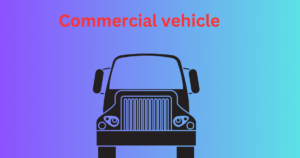How to get Commercial Vehicle Loan
Getting the commercial vehicle insurance involves a process similar to getting personal auto insurance, but with some additional considerations:
-
Assess Your Needs: Determine what type of coverage you need for your commercial vehicle. This could include the liability coverage, collision coverage, comprehensive coverage, underinsured motorist coverage, and more, depending on your business and the nature of your vehicle usage.
-
Research Providers: Look for insurance companies that the specialize in commercial vehicle insurance or offer comprehensive coverage for the commercial vehicles. You can research online, ask for the recommendations from other business owners, or consult with an insurance broker.
-
Get Multiple Quotes: Just like with the personal auto insurance, it’s a good idea to get quotes from multiple insurance providers to compare coverage options and prices. Be prepared to provide the detailed information about your business, vehicles, drivers, and expected usage.
-
Consider Customization: The commercial vehicle insurance policies can often be customized to fit your specific needs. Work with the insurance provider to tailor the coverage to your business requirements and budget.
-
Review Coverage Limits and Deductibles: Make sure that ,you understand the coverage limits and deductibles associated with the insurance policy. Ensure they align with your business’s financial capabilities and risk tolerance.
-
Check for Discounts: Many insurance companies offer discounts for things like having a clean driving record, installing safety features on your vehicles, bundling multiple insurance policies, or paying your premium upfront. Ask about the available discounts to potentially lower your insurance costs.
-
Understand Exclusions and Limitations: Understand and Carefully review the policy documents to understand any exclusions or limitations that may apply. Be aware of any specific circumstances or types of incidents that may not be covered by your insurance policy.
-
Maintain Good Records: Keep thorough records of your commercial vehicle fleet, including vehicle registrations, maintenance records, driver information, and insurance documents. This can help streamline the insurance process and ensure that the compliance with any regulatory requirements.
-
Review and Update Annually: As your business evolves and your commercial vehicle needs to change, it’s important to review your insurance coverage with annually to make sure it still meets your needs. Update your policy as necessary to ensure the adequate protection for your business assets.
By following some these steps and working closely with your insurance provider, you can secure the right commercial vehicle insurance coverage to protect your business and assets.
Types of commercial vehicle loan
-
Preservation of Capital: Opting for a commercial vehicle loan allows the businesses to preserve their capital. Instead of paying the full cost upfront, they can spread the cost over time through regular loan payments, thus keeping the more cash on hand for other operational needs or investments.
-
Tax Benefits: In the many regions, the interest paid on commercial vehicle loans is tax deductible, providing the businesses with potential tax benefits and reducing their overall tax liability.
-
Fixed Costs: Commercial vehicle loans often come with fixed interest rates and the monthly payments, providing businesses with predictability in their budgeting and the financial planning. This stability can be particularly beneficial for small businesses with limited cash flow.
-
Ownership: Unlike the leasing, where the business only has temporary use of the vehicle, taking out a commercial vehicle loan allows the business to own the vehicle outright once the loan is paid off. This ownership provides the flexibility and the potential for long term cost savings.
-
Customization: With ownership comes the ability to customize the vehicle to suit the specific needs of the business. Whether it’s adding the specialized equipment or branding the vehicle with company logos, owning the vehicle gives businesses the freedom to make modifications as they see fit.

